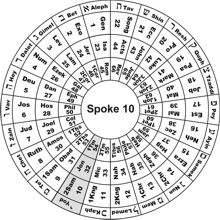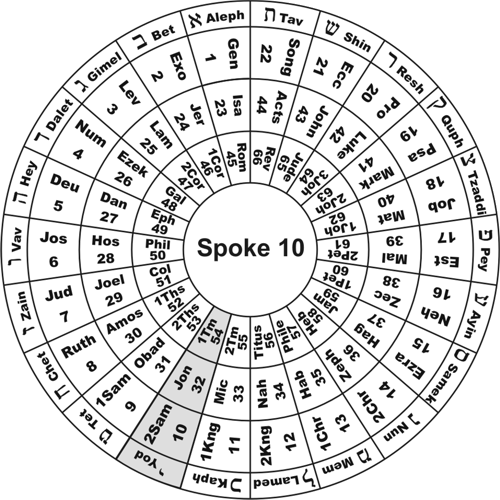Covetousness
For the love of money is the root of all evil: which while some
coveted after, they have erred from the faith, and pierced themselves
through with many sorrows.
1 Timothy 6:10 (Spoke 10, Cycle 3)
Thou shalt not covet thy neighbour's house, thou shalt not covet
thy neighbour's wife, nor his manservant, nor his maidservant, nor his ox, nor
his ass, nor any thing that is thy neighbour's.
The Tenth Commandment
(Exodus 20.17f)
The divine integration of the Ten Commandments with the Christian
Canon finds its
completion here on Cycle 3 of Spoke 10. In fact, the phrase "the end of the commandment"
occurs only here on Spoke 10 in 1 Timothy:
Now the end of the commandment is charity out of a pure heart, and
of a good conscience, and of faith unfeigned:
From which some having swerved have turned aside unto vain jangling; Desiring to be
teachers of the law; understanding neither what they say, nor whereof they affirm.
But we know that the law is good, if a man use it lawfully;
1 Timothy 1:5 (Spoke 10, Cycle 3)
The theme of Covetousness emerges more than a few times in 1 Timothy. In the
qualifications for the bishop, Paul wrote that he must not be
"greedy of filthy lucre [money] nor covetous" (1 Timothy 3.3). He repeated
his admonition agains "filthy lucre" when he gave the qualifications for the
deacon. And again, just before he
before he writes the famous "love of money" verse, he speaks against "men of corrupt
minds" who suppose that "gain is godliness!" Unfortunately this heresy is
still alive and well on planet earth, only now its called the "Prosperity Gospel."
Immediately following these verses, Paul turns the meaning of "great gain" on its
head:
But godliness with contentment is great gain. For we brought nothing into
this world, and it is certain we can carry nothing out. And having food and raiment
let us be therewith content. But they that will be rich fall into temptation and
a snare, and into many foolish and hurtful lusts, which drown men in destruction
and perdition. For the love of money is the root of all evil: which while some
coveted after, they have erred from the faith, and pierced themselves through
with many sorrows.
1 Timothy 6:5 (Spoke 10, Cycle 3)
Note the continued thematic integration with the Tenth Commandment. Everything in
these verses is meant to teach us how to obey it! The same pattern is found in the sequence of the Psalms (KVJ), where
the first occurrence of the word covet* (i.e. covet, coveted, covetous, etc) appears
in Psalm 10 (vs. 3):
For the wicked boasteth of his heart's desire, and blesseth the
covetous, whom the LORD abhorreth.
Psalm 10:3 (Spoke 10 Inner Cycle)
We have a Thematic Link which is amplified by the principle of First Occurrence:
| Thematic Link: The Tenth Commanment | PPsalms( 101 ) PBible( 103 ) PBible( 103 ) |
All of this integrates with the literal meaning of the name of Tenth Letter,
יוד (Yod, Hand). As discussed in the introductory
article, Yod is symbol of personal possession - the hand being that with
which we grasp and hold things. Finally, this manifests in the Hebrew word for
Ten, עשר (esser) which is a pun on the word for
riches or wealth עשר (asher); the only difference
being the pronunciation Shin as "sh" or "s".
Finally then, let us gather what we have seen in this brief review. The order of the
Ten Commandments is integrated with the order of the Hebrew alphabet and the
order of the Christian Canon, and all of this is integrated with the Hebrew pun linking
the Number Ten with Wealth.
Furthermore, the "love of money" verse - perhaps
the most famous Biblical injunction against the violation of Tenth Commandment -
appears here on Spoke 10. Divine Integration! I am at a loss for
words - let me defer to the Apostle Paul:
[Praise the Lord] who is the blessed and only Potentate, the King of kings, and Lord
of lords; Who only hath immortality, dwelling in the light which no man can
approach unto; whom no man hath seen, nor can see: to whom be honour and
power everlasting. Amen.
1 Timothy 6:15 (Spoke 10, Cycle 3)
| 


